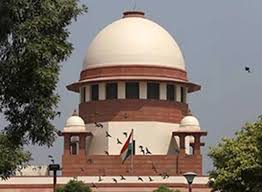The trial court had set aside an award made in the appellant’s favour[Dated 14.12.1997] awarding substantial amounts towards its claim, in the backdrop of a road construction contract. ( Para 1)
The contract between the parties visualized the period for completion of work to be 18 (Eighteen) English calendar months. The due date for completion of work, thus, was 22.01.1985. It was, however, not completed; several extensions were given, on the understanding that they were not due to the contractor’s fault. (Para 2)
The arbitrator, by his award[Dated 14.12.1997.], held the claimant/contractor entitled to the sum of Rs.1,50,07,000/-towards various heads and interest at 12% p.a. for the period 10.12.88 to the date of commencement of arbitration (working out to Rs.133.22 lakhs). The arbitrator rejected the state’s counter claim. (Para 4)
Both the trial court and the High Court held that the award was vitiated by the legal misconduct of the arbitrator under the old Arbitration Act[Indian Arbitration Act, 1940.]. The courts concluded that the claim was time-barred since the disputes in relation to the contract originally awarded in 1983 with the stipulation of the work being completed within eighteen months were no doubt extended with parties’ consent. It was only in 1991 that the claim for nomination of the arbitrator was made, which finally led the contractor to approach the Court under Section 8 of the Act in 1995. It was next held that the order referring the disputes to arbitration [by the Civil Judge (Senior Division)] on 25.02.1997 (in Arb. M.A. 1/1995) were in relation to the works carried on by the contractor under the contract. The courts held that the award of amounts exceeded the terms of reference in respect of at least three items. Consequently, it could not be sustained. (Para 6)
As far as the argument with regard to delay is concerned, the judgments of this court have clearly held that in such matters, the claim crystallizes upon the issuance of the final bill – which in this case was on 14.12.1992. The contractor’s complaint with respect to payment was first aired to the EE in 1988; the rejection resulted in an appeal before the SE, who never rendered his opinion or decision. Even in 1993, (after the final bill was drawn), the SE’s decision was not given. In the circumstances, the claim before the civil court for the appointment of the arbitrator: made in January, 1995 was within the period of limitation. (Para 18)
As far as the question of claims not being within the contracted period, i.e., within the 30-day time granted after foreclosure of the contract is concerned, in the opinion of the court, that issue does not arise having regard to the facts. On account of the inordinate delay (which occurred in the decision by the authorities, resulting in five extensions of time by mutual consent), the contractor voluntarily sought foreclosure. That request was acceded to by the department. There is no dispute that originally, the period of completion of the contract/works was eighteen months. The request for foreclosure, therefore, was deemed reasonable by the department and accepted upon receipt of the appellant contractor’s letter dated 06.04.1990. Such being the case, there could have been no objection to delay in submission of the claim for dispute resolution or arbitration – given that the department itself had sat over the request for settlement of disputes for more than 6 years. Moreover, the defect liability period would end only upon both parties expressing satisfaction and recording it in an agreed manner or predetermined manner. Concededly, that event never occurred. (Para 21)
In the facts of the present case, the award did not, facially disclose any error of law; damages were awarded in accordance with principles embodied in law, and the findings were based on the evidence placed before the tribunal. The ruling of the trial courts and the High Court is nothing short of intense appellate review, which is impermissible in law and beyond the courts’ jurisdiction. (Para 26)
SUPREME COURT OF INDIA
2023 STPL(Web) 196 SC
M/S S.D. Shinde Tr. Partner Vs. Govt. Of Maharashtra & Ors.
Civil Appeal Nos. 6107-6108 of 2017 With Civil Appeal No(S). 6109 of 2017-Decided on 22-8-2023
https://stpllaw.in/wp-content/uploads/2023/08/2023-STPLWeb-196-SC.pdf







